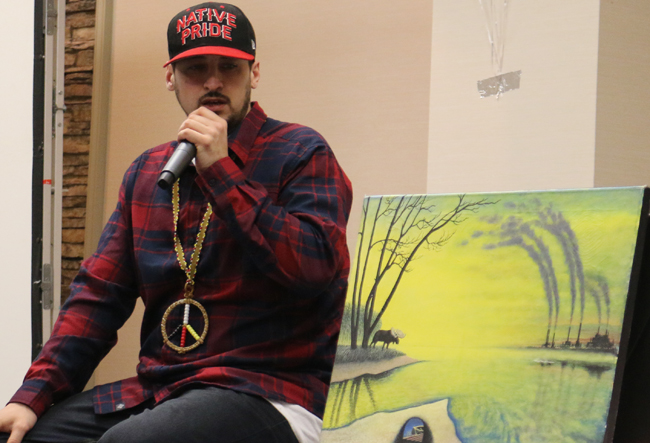Hurt people, hurt people

By Marci Becking
NORTH BAY – Rapper and painter Shibastik from Moose Cree First Nation tells some 40 participants at the annual HIV/AIDS conference hosted by the Union of Ontario Indians to go out into the bush to get your frustrations out.
“Go out into the bush, cry, scream if you have to,” says Shibastik who hosted a “Healing through Hip Hop” workshop on Feb. 10. “All that depression and rage that you have has to get out.”
Shibastik – who started rapping 15 years ago – started speaking to youth about seven years ago in Thunder Bay while he attend a suicide awareness conference. He has worked for years at a youth detention centre with violent offenders, showing them how to express themselves and take care of their emotions.
“There are no bad people,” says Shabastik who incorporates the Seven Grandfather Teachings in his music. “Hurt people, hurt people. It’s important that if you’re hurt to have empathy and that’s the only way you can heal.”
“I used to write poetry when I was younger to get emotions out – to get out the pain. Music can be empowering or depressing. Acknowledge low feelings, but don’t stay in those thoughts.”
Shibastik, who studied fine arts at Georgian College, says that mental health should be focused on when the physical health is low.
“Family, food, warm place to stay, clean water…that’s what’s important. Having ‘stuff’ does not make you happy.”
He’s written powerful songs such as “Hurt People” and “Thunder Cries” – which includes lyrics that teach about the inter-generational effects of Residential Schools.
“I went to school and no one knew me. Teacher looked right through me”
Many Residential School survivors who have heard his lyrics and have heard his teachings have thanked him saying things like “for the first time I could stand up again – I thought no one cared” and “Now people will know – people care”.
He says that it’s hard but it’s important to forgive yourself for the things you’ve done.
“Everyone who committed violent crimes [who I’ve dealt with] were all abused,” Shibastik told the youth at the conference and spoke about the importance of ceremonies and teachings to heal ourselves.
“It’s time to resuscitate the tribes. We need to return to how we as people used to be, used to live. My dad taught me about hunting and respecting animals. My dad taught me never to shoot something that is running away. Animals will present themselves to you.”
“Whatever you want to do with your life, just work at it. If you do it over and over again, you’ll get good at it,” says Shibastik. “Ask for help. The creator is always listening. Just get through it and you will be stronger because of it. If you do the right thing, you will get yourself to where you want to be.”
To listen to Shibastik’s music or learn more about his workshops, visit http://www.shibastik.com/


